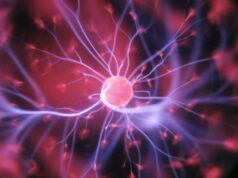
An article accepted into the journal Neuromodulation has concluded that, based on two case reports, non-invasive vagus nerve stimulation (nVNS) might provide clinical benefits in patients with COVID-19 via “multiple mechanisms”.
While most COVID-19 cases are mild, the authors, Peter Staats (electroCore, Basking Ridge, USA) and colleagues acknowledge that a minority of patients develop moderate to severe respiratory symptoms, which they say appears to be due to a hyperimmune reaction—otherwise known as a “cytokine storm”.
“While the search for an antiviral, or a vaccine effective for SARS-CoV-2, the virus causing COVID-19, remains a priority, we also need to put resources and an effort to solving this cytokine storm,” Staats tells NeuroNews.
As VNS has been demonstrated to block production of cytokines in sepsis in animal models and in many other medical conditions (including PTSD, Sjogrens disease, rheumatoid arthritis and stroke), Staats and his team hypothesised that nVNS might provide clinical benefits in patients with respiratory symptoms, such as those exhibited in the novel coronavirus.
The information on the two case reports was obtained via email correspondence and phone interviews with the patients.
According to the authors, in Case 1, the patient used nVNS to aid his recovery at home after hospital discharge, and was subsequently able to discontinue use of opioids and cough suppressant medications. In Case 2, the patient experienced reliable relief from chest tightness and dyspnea within five minutes of using the stimulation. He also observed an improved ability to clear his lungs when he used nVNS to manage his symptoms at home.
“Avoidance of ventilator dependence in both cases and lack of hospitalisation in Case 2 cannot be causally attributed to nVNS, but it is reasonable to speculate that nVNS therapy may have been a supporting factor, via either bronchodilation or inhibition of cytokine release,” argue Staats and colleagues.
They add, given the concerns about number of intensive care unit beds and ventilators amid the pandemic, that it is “imperative to consider all viable therapeutic options”. Thus, they put forward that “the well-established safety and tolerability of nVNS therapy make it a particularly attractive treatment modality that merits immediate study”.
Underlying mechanisms
In terms of how VNS can help patients with respiratory distress brought on by COVID-19, Staats and colleagues allude to two main mechanisms. They write that when the body’s inflammatory response is dysregulated, bronchoconstriction can occur, which limits the flow of air to and from the lungs. “VNS may inhibit this airway constriction through a parasympathetic-sympathetic reflex arc, whereby stimulation of an afferent vagal nerve causes an efferent sympathetically mediated release of catecholamines that results in smooth muscle relaxation,” posit the authors.
Secondly, they argue, based on available evidence, that the cholinergic anti-inflammatory pathway (CAP) is believed to be the vagus nerve-based arm of the inflammatory reflex. “The use of CAP to regulate the inflammatory response has been investigated broadly using varying forms of VNS for more than 20 years, [and] the use of nVNS to target neural pathways to treat inflammatory diseases represents the most recent exploration of this pathway.
A future for nVNS in the setting of COVID-19
Staats and his team believe there is a strong scientific and clinical foundation for the hypothesis that nVNS can improve disease outcomes in patients with COVID-19. They reiterate that the robust established safety and tolerability of the modality strengthens the case for additional investigation and use of nVNS to fight the pandemic.
According to the investigators, an Emergency Use Authorization application was recently submitted to the US Food and Drug Administration (on 2 April, 2020), which aims to facilitate use and further study of nVNS amid COVID-19. Meanwhile, randomised controlled trials are being initiated at multiple sites in both the USA and Europe.
While enrolment has been slower than anticipated, given the impact the pandemic has had on clinical trials, Staats tells NeuroNews that there is now an international consortium investigating whether VNS can have a positive effect that meets once a week.













